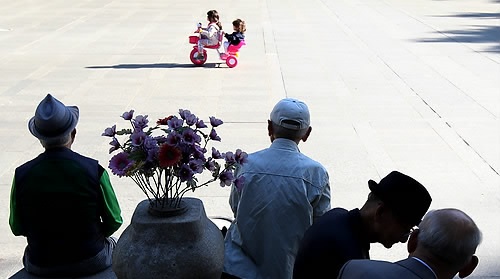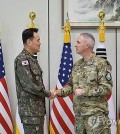- California Assembly OKs highest minimum wage in nation
- S. Korea unveils first graphic cigarette warnings
- US joins with South Korea, Japan in bid to deter North Korea
- LPGA golfer Chun In-gee finally back in action
- S. Korea won’t be top seed in final World Cup qualification round
- US men’s soccer misses 2nd straight Olympics
- US back on track in qualifying with 4-0 win over Guatemala
- High-intensity workout injuries spawn cottage industry
- CDC expands range of Zika mosquitoes into parts of Northeast
- Who knew? ‘The Walking Dead’ is helping families connect
Elderly outnumber children in Seoul for the first time

The aging index, the ratio of elderly people to children, recorded 100.4, exceeding 100 for the first time in Seoul, Korea. (Yonhap)
By Kim Rahn
Senior citizens in Seoul have outnumbered children for the first time, the Seoul Metropolitan Government said Thursday.
As of April 30, there were 1,234,181 people 65 or over in the capital, slightly surpassing the number of children under 15 ― 1,232,194.
The aging index, the ratio of elderly people to children, recorded 100.4, exceeding 100 for the first time.
“The higher index means the number of elderly citizens is increasing more than the younger generation, which will be the working-age population needed to support them,” a city official said.
The index in Seoul was 21.8 in 1996, but rose to 90 in 2013, 97.3 in 2014 and 100.4 this year.
According to the Ministry of Health and Welfare, Seoul’s index was 36.2 in 2003, lower than the nation’s average of 41.3. But it has risen rapidly, surpassing the average this year, 92.2.
“Seoul’s elderly population increased by some 20,600 for the first four months of this year, while the child population decreased by about 18,600 during the same period,” the official said.
With the aging population, Seoul’s citizens’ average age was 40.2 as of April. In the case of Euljiro-dong, in downtown Seoul, residents were 51 on average, making it the only district where the average age was over 50.
“Seoul’s birthrate is among the lowest in the country, while the elderly population here is growing by 60,000 every year,”the official said. “If the trend continues, Seoul will become an aged society by 2018 where the elderly take up more than 14 percent of the total population.”















